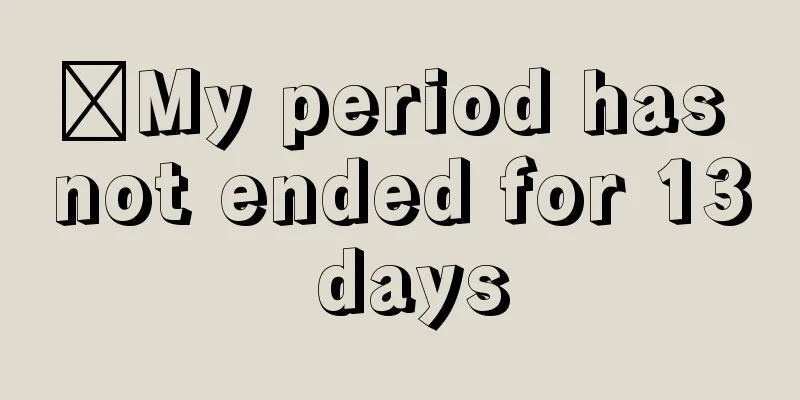My period has not ended for 13 days

|
Generally speaking, a woman's menstruation lasts about a week. It may increase or decrease depending on the woman's physical condition, but the difference is generally not large. Some women have very long menstrual periods, which can last almost two weeks. This situation is not only bad for women's health, but may even cause ischemia in women. So, what should I do if my period hasn’t ended after 13 days? Normal menstrual volume: 20 to 60 ml of menstrual bleeding is normal, and more than 80 ml is menorrhagia. Based on the rough estimate of sanitary napkin usage, the normal usage is to change it four or five times a day on average, with no more than two packs (10 pieces per pack) per cycle. If 3 packs of sanitary napkins are not enough and almost every sanitary napkin is soaked, it means that the menstrual flow is too heavy. If your period lasts more than 7 days, or you have to change your extra-thick sanitary napkin with wings every hour or so, and blood clots are often discharged, then you have symptoms of menorrhagia. Normal menstrual cycle: A menstrual cycle of 35 days is within the normal range. But if your cycle is significantly longer than this, it's time to see a doctor. Through self-examination, if your menstrual volume and menstrual cycle are not within the normal range, you need to pay attention to—— ▲Gynecological diseases. Heavy menstrual flow may be caused by gynecological inflammation, such as vaginitis, pelvic inflammatory disease or endometriosis. These gynecological diseases will make local blood vessels very fragile, and when menstruation comes, there will be a lot of blood that is not easy to coagulate, which will cause heavy menstrual flow and a longer menstrual period. ▲Uterine dysfunction bleeding. For example, anovulatory dysfunctional uterine bleeding and irregular endometrial shedding both cause prolonged menstruation due to endocrine dysfunction. ▲Pelvic inflammatory disease. Pelvic inflammation, intrauterine polyps, endometritis, etc. are all caused by poor intrauterine blood circulation, degeneration and necrosis, or pelvic congestion, which lead to excessive menstruation and prolonged menstruation. ▲Uterine fibroids. Especially for submucosal uterine fibroids, due to the expansion of the uterine cavity area and abnormal contraction, it can cause menorrhagia and prolonged menstruation. ▲Chronic uterine hypertrophy. Due to pelvic congestion, ovarian estrogen continues to increase, causing thickening of the uterine muscle layer, resulting in excessive menstruation and prolonged menstruation. ▲Endometriosis. It often causes menorrhagia or prolonged menstruation due to affecting the contraction of the uterine muscle layer or strengthening the endometrium. Diet therapy to normalize menstruation The ovaries regulate women's physiological cycles, and the good or bad ovarian function will affect the regularity of menstruation. Proper food can regulate a woman's menstrual cycle, so fuel your ovaries with your diet! 1. Women who suffer from severe blood loss should take more high-fiber foods such as spinach, candied dates, red vegetables (vegetables with red soup), raisins, etc. to replenish blood. 2. Avoid eating food that is too hot, too cold, or has drastic temperature changes. 3. Eat enough protein. Eat more high-protein foods such as meat, eggs, tofu, soybeans, etc. for lunch and dinner to replenish the nutrients and minerals lost during menstruation. 4. Eat some foods rich in B vitamins such as walnuts, cashews, dried beans, etc. between meals. 5. Avoid consuming caffeinated beverages. Drinks such as coffee and tea will increase anxiety and uneasiness. You can drink barley tea or mint tea instead. 6. Eat more high-fiber foods. Foods such as vegetables, fruits, whole grains, whole wheat bread, brown rice, and oats contain more fiber, which can promote the secretion of estrogen, increase the magnesium content in the blood, and have the effect of regulating menstruation and calming nerves. |
<<: Reasons for delayed and early menstruation
>>: I got pregnant 2 days before my period.
Recommend
Is it painful to have an IUD inserted?
For women who have already given birth, if they d...
What to do if you have breast hyperplasia after menopause? These methods are very effective
Chinese medicine experts say that if a woman is i...
What to do if the endometrium is thick and bleeding
Thin or thick endometrium actually has a certain ...
What to do if you haven't gotten pregnant after one year of marriage
As we all know, a baby develops from a fertilized...
What to do if pregnant women have gestational hypertension
Do you know that women will always experience var...
Can women practice yoga during menstruation?
Many women who like to exercise will practice yog...
How to effectively treat cervical erosion?
Cervical erosion is a very common gynecological d...
Where is the reflex area of breast hyperplasia?
Although breast hyperplasia is a disease that can...
Bleeding in the stool before menstruation
Many girls will experience some changes in their ...
To quickly identify stroke, remember the "120" rule
Wang Mingyu In life, people have long been accust...
Abdominal pain in late pregnancy
After pregnancy, women will have their most obvio...
Hemorrhoids get worse during menstruation
Hemorrhoids are a common disease symptom among pe...
What are the reasons for low ovulation?
Infrequent ovulation usually seriously affects a ...
What causes buttock pain during early pregnancy?
Although a woman's body does not change as mu...
Why do women suffer from weak knees?
The knee is one of the most important joints in t...









